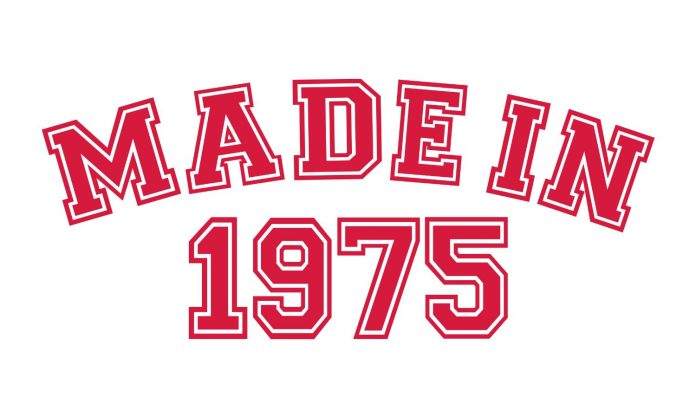It was an extraordinary creative year for cinema, writes Deepa Gahlot, as she picks her favorite 10 Hindi and English films from 1975
The year 1975 was tumultuous. In India, the Emergency caused unrest, Sikkim acceded to India; elsewhere in the world, the long and destructive Vietnam war ended, Microsoft was founded, the first cricket world cup was played in England, Pol Pot and the Khmer Rouge took over Cambodia—to enumerate just a few.
It was also an extraordinarily creative year for cinema—in India Sholay made movie history, in Hollywood Jaws swept the box-office. It would be tough to list just 10 of the best of 1975, but here it is a purely subjective selection, so the year’s big hit Jai Santoshi Maa, that actually introduced the country to a new Goddess and the rituals associated with her, is not included.
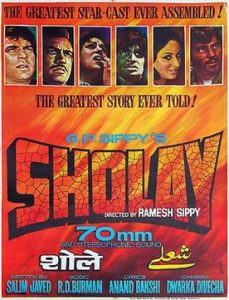
Sholay:
This Ramesh Sippy film became the longest-running film in India, till Dilwale Dulhania Le Jayenge broke its record 20 years later. It rarely happens that the dialogue of a film—written by Salim Javed—passes into common usage, but the lines and characters were unforgettable, the biggest being the villain Gabbar Singh, played by a newcomer, Amjad Khan. The plot was simple—Thakur Baldev Singh (Sanjeev Kumar) of the fictional village of Ramgarh, hires two petty crooks Jai (Amitabh Bachchan) and Veeru (Dharmendra), to rid the people of the Gabbar menace and avenge the mass murder of his family. Hema Malini and Jaya Bachchan were the female leads. A fabulous RB Burman score, and thrilling action—it was destined to be a blockbuster, despite a lukewarm opening.
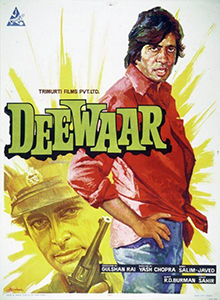
Deewar:
Yash Chopra and Salim-Javed at their peak collaborated on this powerful drama that reflected the new India, with its crime, corruption and unbridled capitalism. Poverty forces one of two brothers (Amitabh Bachchan) to adopt a life of crime, while the other becomes a cop (Shashi Kapoor). Inevitably, there is a clash of values and cynicism. The film has two of the most quoted lines of all time: Mere paas maa hai, and Aaj khush to bahut hoge tum. It escaped the stringent Emergency-era censorship somehow, maybe because the violence in it was not too gory, even as other films were mangled.
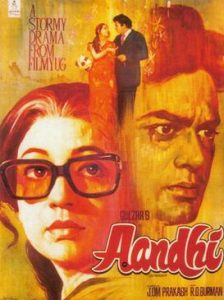
Aandhi:
Gulzar’s story about an ambitious daughter of a politician, Aarti (Bengali legend Suchitra Sen in one of her few Hindi films), who is encouraged by her father into entering the murky world of power, was a thinly-disguised comment on the life of Indira Gandhi. Like her, Aarti puts her political career over her marriage to the placid hotel manager (Sanjeev Kumar), and faces the same troubles from the opposition parties—including the famous stone-throwing incident, that Indira Gandhi turned to her electoral advantage. The film with its haunting RD Burman-composed music was on its way to becoming a hit, when it was banned during the Emergency, for obvious reasons. By the time it returned to the cinemas, it was too late to recapture lost glory.
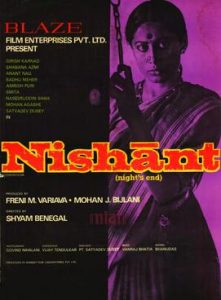
Nishant:
Shyam Benegal followed his clutter-breaking first feature Ankur, with an even more powerful critique of the feudal system in rural Telangana. It had a veritable who’s who of parallel cinema stars – Amrish Puri, Naseeruddin Shah, Girish Karnad, Shabana Azmi, Smita Patil, Kulbhushan Kharbanda, Mohan Agashe, Anant Nag. Susheela (Azmi), the wife of schoolmaster (Karnad) is abducted by the brothers of the zamindar (Puri) of the village, because they believe it is their right to pick any woman they want. The schoolmaster’s pleas to the law go unheeded. But the incident and the schoolmaster’s persistence mobilise the villagers fed-up of the atrocities of the zamindar’s family. The resulting carnage does not even spare the innocent. The film won many awards and was critically acclaimed for its portrayal of the shocking truths about feudal oppression.
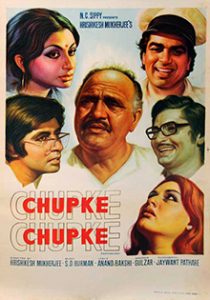
Chupke Chupke:
Hrishikesh Mukherjee’s comedy of manners, enhanced with Gulzar’s writing and the high-powered cast playing against type, Dharmendra playing a botany professor Parimal Tripathi, who is annoyed by his wife Sulekha’s (Sharmila Tagore) admiration for her brother-in-law Raghavendra (Om Prakash). So when they go to meet Raghavendra and his wife (Usha Kiron) after their marriage, Parimal pretends to be the driver Pyare Mohan, and makes their friend Sukumar (Amitabh Bachchan) pretend to be Parimal. Sulekha flirts with the chaste Hindi-speaking Pyare Mohan giving the impression that she is having an affair with the driver. Meanwhile, Sukumar falls in love with Vasudha (Jaya Bachchan), who wonders why a married man is hitting on her. The prank goes on for a while till Raghav admits that he was fooled and Parimal can show his wife that he is smarter than her brother-in-law. The film makes every list of the best comedies made in India.
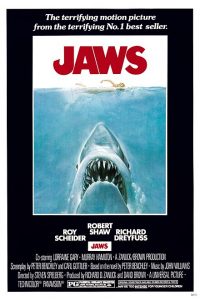
Jaws:
A young Steven Spielberg unleashed terror on audiences, through a vicious great white shark. Based on a novel by Peter Benchley, the mechanical shark chomping on humans made audiences scream and faint, but also became a huge summer blockbuster, the biggest grosser in Hollywood till then, the record beaten by Star Wars two years later. It starred Roy Scheider as the police chief of the small beach town where the shark strikes, and it falls on him to hunt it down, with the help of a marine biologist (Ricard Dreyfuss) and a professional shark hunter (Robert Shaw). Using the Hitchcockian technique of suggesting horror rather than showing it, the presence of the shark is marked with scary music composed by John Williams, and it worked, because people are more afraid of what they cannot see or understand. Spielberg was already considered a promising filmmaker, this film put him on top of the heap of greats. The film has had sequels, spin-offs and copycat movies, but the original is in a class apart.
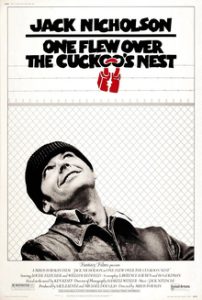
One Flew Over The Cuckoo’s Nest:
Set in a mental hospital, this Milos Foreman film was based on Ken Kasey’s spine-chilling novel. The plot pits Jack Nicholson’s rebellious Randle McMurphy, who has feigned mental illness to avoid prison, against the cold and brutal Nurse Ratched (Louise Fletcher), who terrorises the patients into submission. Randle stands up to her tyranny to help the others and even tries to organise an escape. Unable to control him, Nurse Ratched has him lobotomised. In the chilling last scene, his friend, the mostly silent Chief (Will Sampson), smothers him to death, rather than let him survive as a vegetable, and, cheered on by the others, escapes. Dark and emotionally complex, the film won several academy awards and is considered one of the best films of all time.
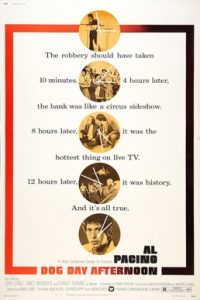
Dog Day Afternoon:
The true crime hostage drama directed by Sidney Lumet, starred Al Pacino in one of his finest performances, as a desperate bank robber, Sonny Wortzik, whose heist planned with two friends, fails. When the bank is surrounded by cops, he takes the employees hostage. He makes demands and attempts to negotiate a plan to get away. Sonny is seen as a decent guy, who spares those who are unwell, but is not willing to stand down. He needs money to pay for the gender reassignment surgery of his partner Leon (Chris Sarandon). In his attempt to make things right for others, Sonny falls into a trap of his own making. He is portrayed more as a tragic character than a criminal. The film was a critical and commercial success, was nominated for and won several awards.
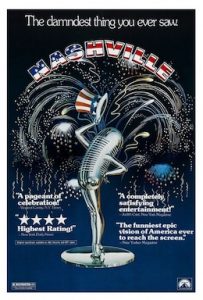
Nashville:
Robert Altman’s musical drama is considered as one of the best films of all time. It has an ensemble cast of 24 actors and terrific music. The film with multiple, intersecting storylines, follows a bunch of people from the gospel and country music industry in Nashville, Tennessee, over a five-day period as they work towards a big fundraiser for a presidential candidate. The film was nominated for a total of Golden Globe Awards, to date the highest number of nominations received by one film. The process of making the film was also experimental. According to imdb.com, it was improvised by the actors and actresses, who used the screenplay only as a guide. They spent a great amount of their time in character, and the movie was shot almost entirely in sequence.”
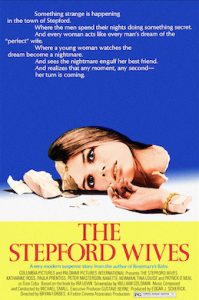
The Stepford Wives:
Based on the psychological horror satire by Ira Levin, the film directed by Bryan Forbes, starred Katherine Ross as a woman who moves to a town called Stepford with her husband (Peter Masterson) and children and finds that the women are strangely subservient to their husbands and obsessed with maintaining impeccable homes. The film received a mixed response, but has grown into a cult since then and the term Stepford Wife has come to denote a robotic woman who has no individuality. The concept was picked up by other sci-fi films, and it has several sequels, inspired the popular TV series, Desperate Housewives and was remade in 2024 with Nicole Kidman.



